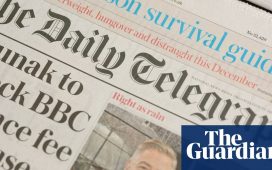Introduction: UK economy set to slow in 2023 and 2024
Good morning, and welcome to our rolling coverage of business, the financial markets and the world economy.
Anxiety over the health of the UK economy is rising, as economists fear that high interest rates have hurt growth.
Economists at KPMG have predicted that UK growth will slow sharply in the second half of this year, as high interest rates, continued uncertainty and low productivity weigh on the economy.
They fear the UK could “struggle to keep its head above water in the second half of the year”, as “renewed signs of stress” hit the economy.
KPMG predicts UK growth will slow to just 0.4% this year, down from 4.1% in 2022, and slow further to just 0.3% in 2024.
Inflation is expected to slow, from 9.1% last year to 7.5% in 2023, and then 2.7% in 2024, thanks to easing supply chain bottlenecks and falling energy prices.
Concerns over the UK economy prompted the Bank of England to leave interest rates on hold at 5.25% last Thursday, after 14 consecutive rises in borrowing costs.
The OECD has also predicted weak growth for Britain – last week it predicted the economy would grow by 0.3% in 2023, and by 0.8% in 2024.
And last Friday, industry data showed that Britain’s economy suffered a sharp fall in private sector activity this month.
But, as KPMG points out, the global economy seems to be losing momentum too, with trade volumes shrinking and rising concerns over China’s economy.
There’s another risk too – businesses may be put off from investing in the UK until the general election has taken place. Uncertainty over the government’s fiscal plans, and key policies, risk deterring or delaying spending.
Yael Selfin, chief economist at KPMG UK, says:
“While interest rates have now potentially reached their peak in this cycle, uncertainty remains regarding their future path.
This coupled with uncertainty around future plans for fiscal policy as the UK heads into an election year, may see businesses choose to further delay investment.”
KPMG predicts the upcoming general election will prompt new spending pledges to, for example, address safety concerns around school buildings or patch up the deficits run up by some local authorities.
The agenda
-
9am BST: German IFO institute’s business climate index
-
11am BST: CBI distributive trades survey of UK retail
-
1.30pm BST: Chicago Fed national activity index for the US economy
-
2pm BST: ECB president Christine Lagarde testifies to the Committee on Economic and Monetary Affairs of the European Parliament
Key events
Shares in London have slipped lower through the day, with the FTSE 100 blue-chip index now down around 85 points, or over 1%, at 7601 points.
Gambling group Entain are now down over 11%, after it reported a fall in online gaming revenues following measures to make the industry safer, and unfavourable sports results in September.
The New York stock exchange has opened in the red, as Wall Street investors continue to fret about how long US interest rates will stay high, and chaos on Capitol Hill.
The Dow Jones industrial average has dipped by 0.35% or 118 points to 33,845, with 24 of its 30 stocks in the red.
The broader S&P 50 is down 0.15%.
Fiona Cincotta, senior financial markets analyst at City Index, says US stocks are being hit by concerns over the US Federal Reserve’s hawkish stance after its meeting last week, and worries over a U.S. government shutdown.
She adds:
The three leading indices on Wall Street head into the final week of September on a negative note, which seems fitting for the month. September is typically a negative month for US equities. The Nasdaq100 has been the hardest hit and is set to fall just shy of 6% across September, potentially its worst monthly performance since last December.
The latest leg lower has come after the Federal Reserve signaled that it may raise interest rates again this year and ease rates by less next year.
In addition to a hawkish Fed, the ongoing budget standoff in the Federal government is also weighing on sentiment. The government is set to run out of money for its operations at the start of October, and Democrats and Republicans in Congress warn that a deal may not be reached. Even a plan for a 45-day extension to give legislators more time is coming up against resistance. Washington’s latest budgetary showdown comes just a few months after the US debt ceiling crisis, which brought the US economy almost to the brink of default.
Lagarde: signs of further weakness in eurozone economy in Q3
The head of the European Central Bank has warned MEPs today that the eurozone economy remains weak this quarter.
Testifying to the European Parliament today, Christine Lagarde said:
Euro area activity broadly stagnated in the first half of 2023, and recent indicators point to further weakness in the third quarter. Lower demand for euro area exports and the impact of tight financing conditions are dampening growth, including through lower residential and business investment. The services sector, which had been resilient until recently, is now also weakening.
The labour market has so far remained resilient despite the slowing economy, with the unemployment rate staying at its historical low of 6.4% in July. But while employment grew by 0.2% in the second quarter, job creation in the services sector is moderating and overall momentum is slowing.
Looking further ahead, Lagarde predicted that economic momentum will pick up as consumer spending and real incomes rise, supported by falling inflation, rising wages and a strong labour market.
The ECB’s latest staff projections forecast growth of 0.7% in 2023, 1.0% in 2024 and 1.5% in 2025, Lagarde adds (these predictions were first released two weeks ago).
Deutsche Bank subsidiary paying $25m penalty to SEC
Deutsche Bank’s asset manager DWS has agreed to pay $25m to settle charges of violating anti-money laundering regulations, and of misrepresenting its environmental, social, and governance (ESG) investment process.
The US Securities and Exchange Commission has announced it has charged DWS with two separate enforcement actions.
One addresses its failure to develop a mutual fund Anti-Money Laundering (AML) program, and the other concerning misstatements regarding its Environmental, Social, and Governance (ESG) investment process, the SEC says.
Gurbir S. Grewal, Director of the SEC’s Division of Enforcement, explains:
“The SEC’s order finds that DWS advised mutual funds with billions of dollars in assets yet failed to ensure that the funds had an AML program tailored to their specific risks, as required by law.”
The SEC also accuses DWS of claiming to be a leader in ESG, but failing to actually fully implement its global ESG integration policy.
“Whether advertising how they incorporate ESG factors into investment recommendations or making any other representation that is material to investors, investment advisers must ensure that their actions conform to their words,” said Sanjay Wadhwa, Deputy Director of the SEC’s Division of Enforcement and head of its Climate and ESG Task Force, adding:
“Here, DWS advertised that ESG was in its “DNA,” but, as the SEC’s order finds, its investment professionals failed to follow the ESG investment processes that it marketed.”
Today we announced Deutsche Bank Subsidiary DWS Investment Management Americas will pay $25 million to settle SEC charges related to ESG and anti-money laundering violations.https://t.co/s4HRRTo5mW
— U.S. Securities and Exchange Commission (@SECGov) September 25, 2023
Over in the US, an economic index has suggested economic growth slowed in August.
The Chicago Federal Reserve’s National Activity Index has dropped to -0.16% for August, down from +0.07 in July.
The index tracks activity in the US economy. The Chicago Fed says all four categories which make up the index made negative contributions in August.
Here’s the details:
Production-related indicators contributed –0.02 to the CFNAI in August, down from +0.12 in July. Industrial production moved up 0.4 percent in August after increasing 0.7 percent in the previous month.
The contribution of the sales, orders, and inventories category to the CFNAI ticked up to –0.03 in August from –0.04 in July. The contribution of employment-related indicators to the CFNAI was unchanged at –0.04 in August.
The contribution of the personal consumption and housing category to the CFNAI moved down to –0.08 in August from +0.03 in July.
Amazon invests in AI start-up Anthropic
E-commerce giant Amazon has agreed to invest up to $4bn in AI startup Anthropic, as it tries to compete more closely with rivals such as Microsoft, Nvidia and Google in the artificial intelligence world.
The deal will make Anthropic’s AI chatbot, Claude, widely accessible to Amazon Web Services customers, they say.
AWS will become Anthropic’s primary cloud provider for mission critical workloads, with the AI company agreeing to train its AI models on Amazon’s AWS Trainium and Inferentia chips.
Amazon will invest $1.25bn initially, for a minority stake in Anthropic, but this can be lifted to $4bn in future.
Reuters says:
The news represents perhaps Amazon’s biggest answer yet to challenges from Microsoft and Alphabet’s Google, smaller cloud rivals that have marketed or developed powerful AI this year. The deal also shows ongoing maneuvering by the cloud companies to secure ties with AI startups reshaping their industry.
Since 2019, Microsoft has put billions of dollars into its partnership with ChatGPT’s creator OpenAI, giving its customers special access to the startup’s prose-writing, image-generating technology.
Today, we’re announcing that @Amazon will invest up to $4 billion in Anthropic. The agreement is part of a broader collaboration to develop reliable and high-performing foundation models. pic.twitter.com/lPJ03oqr6C
— Anthropic (@AnthropicAI) September 25, 2023
Our agreement provides Anthropic with access to @awscloud Trainium and Inferentia chips. We’ll also offer enhanced support of Amazon Bedrock with secure model customization and fine-tuning for businesses.
— Anthropic (@AnthropicAI) September 25, 2023
The Amazon team will be able to build on top of Anthropic’s state-of-the-art models via Amazon Bedrock to enhance existing applications, and create net-new customer experiences across Amazon’s businesses.
— Anthropic (@AnthropicAI) September 25, 2023
Training state-of-the-art models requires extensive resources including compute power and research programs, and Amazon’s supply of compute infrastructure alongside other providers will ensure we’re equipped to continue advancing the frontier of AI safety and research.
— Anthropic (@AnthropicAI) September 25, 2023
As part of the investment, Amazon will take a minority stake in Anthropic. Our corporate governance remains unchanged and we’ll continue to be overseen by the Long Term Benefit Trust, in accordance with our Responsible Scaling Policy.
— Anthropic (@AnthropicAI) September 25, 2023
We look forward to working closely with Amazon to responsibly scale adoption of Claude and advance safe AI in the cloud.
Read more in our blog post: https://t.co/QxXVUgIUfE
— Anthropic (@AnthropicAI) September 25, 2023
The pound looks set to be the worst performing G8 currency this month, reports Michael Hewson of CMC Markets, and on course for its biggest monthly decline since August last year.
Aldi reports record UK sales amid cost of living crisis
The boss of Aldi’s UK and Ireland business has said the cost-of-living crisis has changed shopping habits, after reporting record sales in the UK last year.
Giles Hurley, chief executive officer of Aldi UK and Ireland, points out that “households are still under real pressure from higher living costs,” as it reported its finances for last year.
Shoppers are making fewer trips to the supermarket, buying more own-branded items and are switching which supermarket chain they use more regularly, Hurley reports.
Hurley says:
“Although inflation is easing, households are still under real pressure from higher living costs.
“As a result, Britain is shopping very differently to how it did 18 months ago – fewer trips, more own label products, and switching supermarkets in search of better value.
Here’s the full story:
Retail sales fall again in September, reports CBI
Retail sales volumes fell in the year to September for a fifth month running, new data just released by the CBI shows.
Around 34% of retailers reported that sales volumes were lower than last year, while just 20% said volumes were up.
That gave a balance of 14% of retailers saying retail sales volumes were down in September, an improvement on the 44% balance in the year to August.
Suppliers also reported that orders dropped this month, with retailers expecting to cut back on orders in October too.
Martin Sartorius, CBI principal economist, says:
“There are some elements of optimism in our survey with retailers expecting the recent fall in sales to continue to ease. Last week’s lower than expected inflation figures, which in turn will ease pressure on household budgets, will also give retailers some hope going into the crucial autumn and winter trading period.
“However, higher oil and fuel prices could mean sticky inflation is with us for a while longer. There is an opportunity in the forthcoming Autumn Statement for policy makers to create a business environment for growth – whether it’s through an investment-focused tax regime or helping firms find or reskill the staff they need through a reformed Apprenticeship Levy.”
Pound hits six-month low
The pound has hit its lowest level against the US dollar in six months.
Sterling touched $1.221 this morning, the lowest since 24 March.
The pound is being hit by the UK economy’s weakness, after Friday’s poor PMI report fuelled recession worries.
But its also about the dollar’s strength – as traders anticipate US interest rates will be higher for longer, just as the Bank of England pauses its interest rate rises.
Stephen Innes, managing partner at SPI Asset Management, says:
The Fed’s updated projections suggest that the US Dollar will remain strong due to a robust economy and labour market. If the current run of robust economic activity persists, the Fed is on record they will raise rates and delay rate cuts. This could weaken the Euro and Sterling, especially with the continent’s Central Bank policy heading in the opposite direction.
The Fed’s policy reversal bar is high, but market concerns may arise if the anticipated economic “pothole” happens. A more balanced global growth outlook is needed, which requires European and Chinese economic activity to pick up.
FTSE 100 in the red
Anxiety over China’s economy has helped to knock shares lower in London this morning.
The FTSE 100 index has dropped by 62 points, or 0.8%, to 7621 points. Mining companies are among the fallers, with copper producer Antofagasta (-3.3%), Rio Tinto (-3.2%) and Anglo American (-3%) among the fallers.
Gambling firm Entain’s shares are now down 9.5% after it warned this morning that online net gambling revenues will be lower than expected.
Evergrande’s struggle to restructure its debts (see earlier post), and concerns that US interest rates will remain higher for longer than hoped, are hitting equities.
Susannah Streeter, head of money and markets at Hargreaves Lansdown, says:
The deep problems in the Chinese property sector have bubbled to the surface again provoking fresh unease about the structural faults running though the world’s second largest economy.
The sprawling real estate giant Evergrande has run into a roadblock in its attempts to restructure its debt, with expectations of new restructured debt being issued now scuppered by an ongoing official investigation into its major subsidiary, Hengda.
There had been hopes that intricate financial engineering will stop the property sectors woes from overflowing to other sectors, but doubts have crept back in about the long-term effectiveness of this tinkering.









